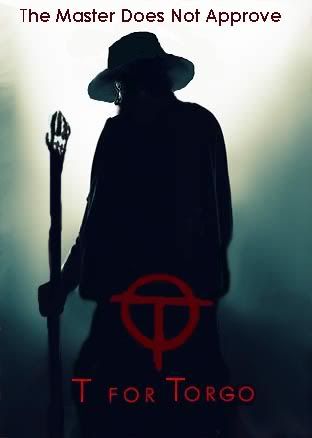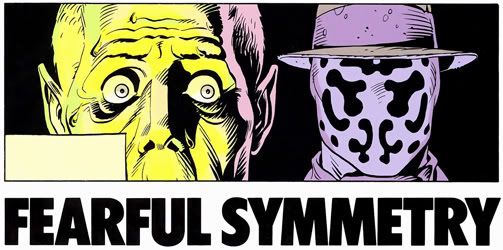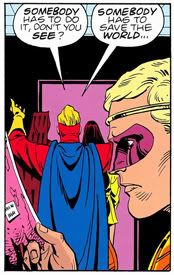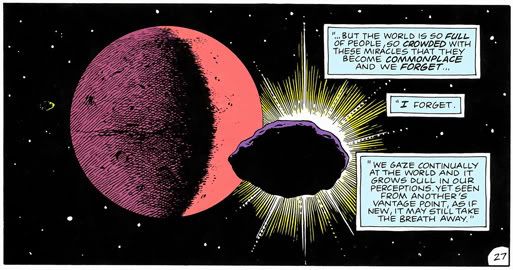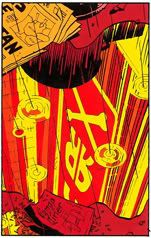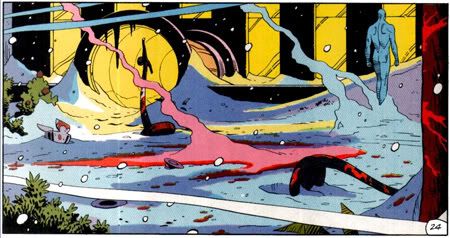
This weekend the finale of Battlestar Galactica aired, bringing a satisfying end to one of my favorite TV series. I thought I’d talk about that, since I seem to be into talking about things these days, and I want to hear your thoughts too.
But, seriously – MAJOR SPOILERS for the finale and the entire series up ahead. Seriously, I’m not holding back, even the photos are going to be massively spoilery. So don’t keep reading if you’re not caught up. You’ve been warned!
There seems to be a pretty wide consensus that Battlestar started off as an amazing show, but then somewhere in Season 3 started to drop in quality. I’m not sure I’ve ever really shared that view. I don’t know if people just didn’t like some of the writing decisions, or didn’t like some of the Cylons becoming good, or whatever. Some parts of the last season meandered here and there, but no show’s perfect. But I will say that, as the show went on, it started to frustrate me in its decisions of what to show and what to assume the audience will infer. I don’t want a show to hold my hand and explain every little point, but I did feel there were some major opportunities for exploration and illustration that the show consciously ignored. Especially in Season 4: I really wanted to spend more time with the newly-activated Final Five Cylons, seeing how realizing their true nature had changed their lives. Watching them trying to keep their secrets on a ship with very little privacy. (We did see hints of this when they’d hold Secret Meetings here and there, but I didn’t feel that many of those scenes spoke to the uniqueness of their situation. They almost could have been a band of common saboteurs and most of the scenes would have played out the same way. But then again, maybe that’s the point?) After the big midseason reveal of Ellen as the final Cylon, God(s), I wanted to see someone react to it! Even her husband’s reaction was truncated by the Executive Producer credits. We can only assume everyone else learns this; and an off-handed gaffe of Lee’s the next episode does reveal that at least someone was told, but it’s unclear exactly who, and seriously, who wouldn’t love to have seen his reaction to this news? Or Bill’s reaction, or Six’s? I don’t know. Which is my roundabout way, I guess, of saying that I didn’t really expect the series finale to wrap everything up in a neat little bow. It’s just not how the show rolls. We do get a lot of answers, some great character moments and satisfying payoffs. I was surprised and impressed by the climactic battle during the first half (how can you not love the spectacle and symbolism of a modern Centurion cold-blooded shooting the head off the retro model?) and of course greatly taken by the emotional denouement. But as great as the episode is, and as appreciated as all the answers are, there is one answer that’s problematic, because (or in spite) of the fact that it’s a non-answer; it’s a small aspect of the show, but also something that informs everything that happens, Has Happened and Will Happen Again. The problem is God. Not that I think the presence of a higher power is inherently a problem in fiction, science- or otherwise. There’s a great episode of Futurama where Bender gets lost in space, floating alone through nothingness. Well, almost alone: a collision with a small asteroid results in a race of ant-sized people living on Bender’s belly, and these people are quick to christen their metal benefactor as God, worshiping him and praying for his help and guidance. Bender loves this, of course, but ends up pretty bad at playing All-Powerful Deity, at first doing too much for his people, then not enough. His failures culminate in his worshippers nuking each other out of existence, and Bender is left sad and alone again – until he meets a faceless cosmic entity that is, essentially, the real God. In contrast to Bender’s rookie mistakes, this God advocates a soft touch, saying “if you do things right, they’ll wonder if you’ve done anything at all.” Man, if you do believe in a higher power, this sounds pretty convincing, doesn’t it? If you can do anything, but you’re benevolent and you want your people not just to survive but to be able to survive, you’ve still got to be careful and subtle. And at first it would seem that Battlestar’s God – or “creator” or “unseen force” or whatever “he” wants to be called – is just that, speaking to Baltar and Six in daydreams, sending Roslin back to that Opera House again and again, subtly manipulating events and movements to deliver Hera safely to the not-exactly-promised land. There’s lots of appropriately soft touching going on… until we get to Kara Thrace. For the record: I’m still convinced that Kara is the daughter (whether real or adopted) of Daniel, the missing and vaguely-referenced Cylon model #13. That’s really the only thing that would explain her visions, her special destiny, and, come on, her father teaching her the Cylon theme song which points to the coordinates of Earth. It’s weird that this is never explicitly stated in the show, but it would be even weirder to mention the presence of a 13th model and then never do anything with it (Ron Moore has basically denied this, but you know, so little is said in the show either way that there’s really nothing to disprove my theory, so there). But, okay, fine, it’s Battlestar, not everything is going to be explained. I’d assumed that, having come back from the dead, she was either the first Cylon hybrid or the first Human cloned using Cylon methods or whatever. But her last scene in the series turns everything on its ear. Lee, in the middle of a wide, empty green field with Kara, is discussing what he wants to do with his “retirement”. He excitedly turns away for a moment, taking in the brave new world – then turns back to find she’s gone. Having just said that she feels like she’s served her purpose. Remember, this is a wide empty green field; it’s not like she’s found a tree to hide behind in the last four seconds. No, Kara Thrace is gone, as in disappeared, as in off the mortal plane, as in she is dead and probably has been since we all saw her die back in Season 3. Well, shit. Ghosts and angels and visions are not exactly unheard of in the Battlestar world. But Kara’s presence was more long-term than a fleeting daydream, and far more tactile. Since coming back from the dead, she’s shot people. She gave Gaius her dogtags. She brought back a spaceship that people have used! This was not some mass hallucination; this was an honest-to-God flesh-and-blood human being who had a job to do, did her job and a lot else along the way, and then just ceased to exist when her job was done. Okay. She has to have been an instrument of God. There’s no other possible explanation. It makes sense, right? You can buy into that, can’t you? But here’s the problem. Once you have bought into that, how can the series maintain its dramatic tension? How can we worry for our characters when God can just bring them back to life whenever? These resurrections are nothing new for television, movies or any kind of serialized media. But generally there’s some sort of explanation, half-assed as it usually is, where oh the bodies were switched at the morgue or I managed to escape before the building exploded or actually that was my twin sister. But here, for Kara Thrace – as it is for several issues of the show – the explanation is that there is no explanation. It was God’s will and we have to go along with it.



It’s almost like Bender took over the show for a few minutes. God’s really making his presence known here, which could beg the cynical question, why do the humans even need to bother? It’s the age-old question of free will vs. predestination, and the show seems to come down pretty hard on the side of predestination in at least this one area. Gaius says in the finale that “God isn’t on anyone’s side”, but that seems kind of disingenuous given the effort God is making to ensure our heroes get to Earth. On the one hand, that’s a pretty ballsy move, especially for a work of Science Fiction, a genre that gets its kicks in finding rational explanations for the impossible. On the other hand, we also begin to lose interest when we discover our protagonists have omnipotence on their side. It’s almost like the fix is in, and it’s a bit disappointing to discover that you didn’t win the fight solely on your own merits. To its credit, though, Battlestar is as bittersweet in its victories as in everything else. Whatever I expected the characters to do if they did find Earth, it wasn’t to split up and live whatever life nature throws at them. It seems a little much that everyone would give up on simple essentials like toothpaste and toilet paper, but I do like the thematic idea that both sides end up rejecting the technology that brought them to death’s door. But, God, there’s just a staggering lack of any kind of unity amongst our heroes once they arrive. There’s no fraternal desire to stick with the friends made during tough times. These guys have been cramped up together for so long that they can’t imagine anything better than getting away from everyone. Lee wants to go climb every mountain he can find, but doesn’t seem at all interested in a future with Kara. Bill bids a strangely permanent goodbye to his son – what’s he planning? And poor Chief (who, in my opinion, has to be the true hero of the series – to have suffered through such a horror show of heartbreak and duplicity, and yet still have the will to even live, is probably the most superhuman feat of all) exiles himself to a decidedly unpopulated island, assumedly so there won’t be anyone else left in his life to betray him. But everyone’s at an odd peace with their decisions, controversial as they may be. It’s almost like they’re already living in an afterlife. And it’s pretty sad to learn that almost all of these characters end up as genetic dead ends: if Hera truly is mother to all of us, then the Adamas and the Tighs and all the other bloodlines we know and love won’t be much longer for this world after all. I think that may actually be the most depressing aspect of the entire show, for me, in a weird existentialist way. But emotional response is what it is. I mean, who am I kidding, I love Battlestar to death, and I’m going to miss it a lot. I may bitch about a few things here and there, but really this was as great a finale as anyone could hope for a show that’s always been a cut above; deeply thoughtful, often controversial, always entertaining. Today, the show has left a huge void in television that I don’t think we’ll see filled anytime soon.




